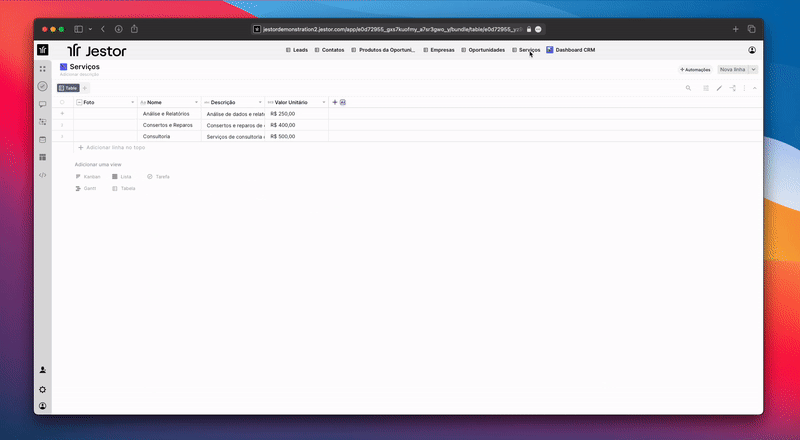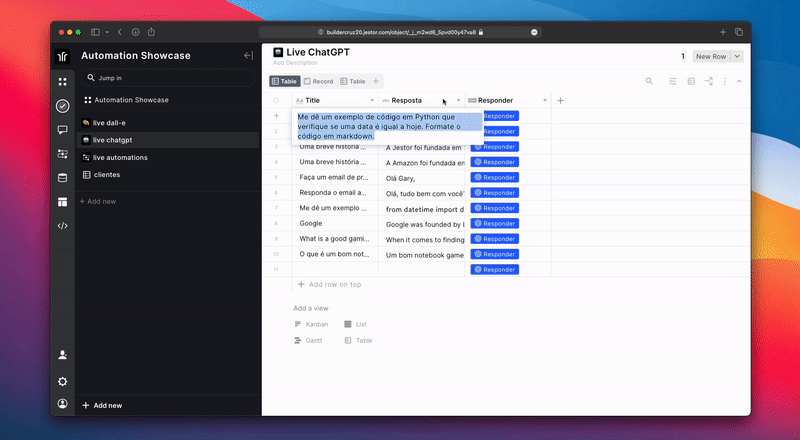The Future of Database: No-Code with Powerful AI

Databases have played a crucial role in organizing and managing vast amounts of information. However, the traditional approach to building and maintaining databases required specialized skills and expertise. With advancements in technology, the future of databases is heading towards a more accessible and user-friendly solution: no-code platforms powered by powerful AI.
This article explores the future of databases and the transformative potential of combining no-code development with AI capabilities.
Evolution of Databases

Databases have come a long way since their inception. From simple flat-file systems to complex relational databases, the evolution has been driven by the need for more efficient data storage and retrieval. Traditional database management systems (DBMS) required extensive programming knowledge and technical expertise to design and maintain. While these systems served their purpose, they posed barriers to entry for non-technical users and limited the speed of development.
What is a no-code platform?
A no-code platform is a software development environment that enables users, even those without extensive programming knowledge or technical expertise, to create applications without the need to write traditional code. These platforms provide a visual interface, often accompanied by drag-and-drop functionality, and offer a collection of pre-built components or templates that users can utilize to design and build their applications. By eliminating the requirement for coding, no-code platforms aim to democratize software development, allowing individuals from various backgrounds to bring their ideas to life and create functional applications more efficiently.
How does artificial intelligence (AI) enhance database management?
Artificial intelligence plays a significant role in enhancing database management by introducing automation, intelligence, and efficiency into various aspects of the process. AI algorithms can analyze large volumes of data, identify patterns, and make predictions or recommendations based on the insights derived. When it comes to database management, AI can automate tasks such as data modeling, schema design, and performance optimization. By learning from user interactions and historical data, AI systems can continuously improve their ability to optimize database performance, streamline operations, and ensure data integrity. The integration of AI into database management enables organizations to handle data more effectively, reduce manual effort, and make data-driven decisions with greater accuracy and speed.
Benefits of No-Code Databases
The integration of no-code platforms with powerful AI has numerous advantages. Firstly, it eliminates the need for extensive programming knowledge, enabling a broader range of individuals to create and manage databases. This democratization of database development reduces dependency on specialized resources and accelerates the development cycle. Secondly, no-code databases provide a more intuitive and user-friendly interface, allowing users to visually design and customize their databases without writing complex code. This ease of use improves productivity and fosters innovation.
- Easy to use: No-code databases are designed to be user-friendly and require little to no coding skills. They provide a visual interface that allows users to build and manage databases using drag-and-drop functionality or simple forms. This accessibility makes it possible for non-technical users to create and customize databases without relying on developers or IT teams.
- Rapid development: With no-code databases, you can quickly prototype and develop database applications. The visual interface and pre-built templates enable you to build databases and define data structures efficiently. This speeds up the development process and allows for rapid iteration and deployment of applications.
- Increased productivity: No-code databases simplify the development process by eliminating the need for manual coding. This frees up time for developers and enables them to focus on higher-value tasks. Additionally, non-technical users can independently create and manage databases, reducing dependency on IT teams and accelerating project timelines.
- Flexibility and customization: No-code databases provide flexibility in terms of data modeling and customization. You can easily define relationships between tables, create custom fields, and set up validation rules without writing complex code. This adaptability allows you to tailor the database to specific business requirements and evolve it as needed.
- Integration capabilities: No-code databases often offer integration capabilities with other tools and services. You can connect your database to various applications, such as CRMs, marketing automation platforms, or analytics tools, to streamline data flows and enhance functionality. This integration potential enables you to create comprehensive solutions that span multiple systems.
- Scalability: No-code databases are designed to handle growing data volumes and user demands. They typically provide automatic scalability and can accommodate increasing data storage and processing requirements without significant performance degradation. This scalability ensures that your applications can handle larger workloads as your business grows.
- Cost-effectiveness: Compared to traditional database development, using no-code databases can be more cost-effective. By reducing reliance on specialized developers and simplifying the development process, you can save on development costs. Additionally, the lower learning curve and increased productivity can lead to faster time-to-market and higher returns on investment.
Can individuals without technical expertise create and manage databases using no-code platforms?

Of course! No-code platforms are specifically designed to empower individuals without extensive technical expertise or programming knowledge to create and manage databases. These platforms typically offer intuitive visual interfaces that allow users to design and build databases using graphical tools, drag-and-drop functionality, and customizable templates. The visual nature of no-code platforms simplifies the database creation process, eliminating the need for writing complex code or understanding intricate database structures. Instead, users can focus on defining data models, establishing relationships between entities, and configuring database settings through user-friendly interfaces. No-code platforms provide an accessible and user-centric approach to database management, enabling individuals from various backgrounds to take control of their data without relying on technical specialists.
How will the combination of no-code platforms and artificial intelligence (AI) impact the future of databases?
The combination of no-code platforms and artificial intelligence (AI) holds tremendous potential to transform the future of databases in several ways. This fusion of technologies will bring about the following impacts:
- Democratization of Database Management: No-code platforms, with their user-friendly interfaces and simplified development processes, will empower a broader range of individuals, including citizen developers, subject matter experts, and business users, to participate in database management. By eliminating the need for extensive coding knowledge, no-code platforms will democratize access to database creation and maintenance, reducing the dependency on specialized IT teams.
- Increased Efficiency and Productivity: AI-powered automation will streamline and optimize various aspects of database management, such as data modeling, schema design, indexing, and query optimization. By leveraging AI algorithms and machine learning, databases will become more intelligent, capable of self-tuning and self-optimization. This will result in improved performance, faster data processing, and reduced manual effort, ultimately enhancing the overall efficiency and productivity of database management.
- Enhanced Data Insights and Decision-Making: AI algorithms can analyze vast amounts of data, identify patterns, and derive valuable insights. By integrating AI into databases, organizations can unlock deeper and more meaningful insights from their data. AI-powered analytics and predictive capabilities will enable more accurate and data-driven decision-making, driving innovation and competitive advantage.
- Intelligent Data Governance and Compliance: AI can assist in enforcing data governance policies and ensuring regulatory compliance. By continuously monitoring and analyzing data usage patterns, AI systems can identify potential data breaches, anomalous activities, or non-compliant behaviors. This proactive approach to data governance will help organizations maintain data integrity, privacy, and compliance with applicable regulations.
Overall, the combination of no-code platforms and AI will revolutionize database management, making it more accessible, efficient, and intelligent. It will enable organizations to leverage the power of data effectively, derive valuable insights, and drive innovation in various domains.
Security and Privacy Concerns
As with any technology that handles sensitive data, security and privacy are paramount. No-code databases need to adhere to robust security measures to protect user data. Data encryption, user access controls, and regular security audits are essential to mitigate risks. Furthermore, privacy regulations, such as the General Data Protection Regulation (GDPR), must be followed to ensure compliance and protect user privacy.
Future Implications and Opportunities
The future of databases lies in the fusion of no-code platforms and AI capabilities. As AI continues to advance, it will enhance the automation and intelligence of database management systems, making them even more intuitive and efficient. This evolution opens up new opportunities for businesses and individuals to harness the power of data without the barriers of technical complexity. From small businesses developing their own custom databases to enterprises creating complex data-driven applications, the future is bright for no-code databases with powerful AI.
Conclusion
In conclusion, the future of databases is set to be revolutionized by the combination of no-code development and powerful AI. This transformative synergy democratizes database management, empowering users with varying technical backgrounds to create and manage databases efficiently. No-code platforms provide a user-friendly interface, while AI brings intelligence and automation to database management. By eliminating barriers to entry and simplifying complex tasks, no-code databases with powerful AI open up new possibilities for innovation and data-driven decision-making.

